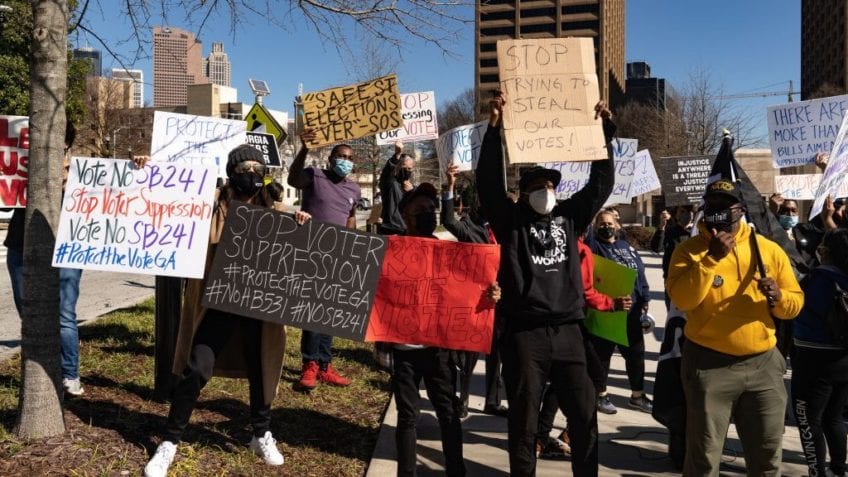U.S. Senate race needs an emphasis on urban issues
The campaign jousting to replace former Massachusetts U.S. Senator John Kerry is off to a spirited start.
Congressmen Ed Markey and Stephen Lynch have emerged as prominent contestants from the Democratic Party. State Rep. Dan Winslow, former U.S. Attorney Michael Sullivan and businessman Gabriel Gomez have surfaced among the most visible Republican candidates.
Disappointingly, only generalities have emerged about what policy path each candidate plans to follow if they were elected to the Senate later this year.
And no candidate has begun to outline their positions on urban issues to voters in such cities as metro Boston, Springfield and Worcester, where communities of color are prominent, and — in the most recent statewide election cycles — have been highly engaged.
That’s a problem.
Since 2008 — when Deval Patrick was elected as the first non-white governor — voter participation has increased statewide, with increased voter turnout coming from the urban centers. State turnout crested to an historic level in the recent 2012 presidential election at 3.1 million — or 73 percent turnout — a record, according to Massachusetts Secretary of State William Galvin.
While communities of color continue to stay at home during municipal elections (black and Latino voters turnout was 15 percent during the 2011 Boston City Council elections), their engagement is significantly higher in statewide contests.
While black voter participation was high in light of President Barack Obama’s re-election, turnout last November was buoyed by the U.S. Senate race between former Sen. Scott Brown and his challenger, Elizabeth Warren. Both candidates campaigned vigorously in the cities across the state. Brown picked up the endorsements of former Boston Mayor Ray Flynn and former Springfield Mayor Charlie Ryan as he contested for urban voters.
Elizabeth Warren invested heavily in the black and Latino communities in Springfield, Boston, Lawrence, Lowell and Framingham, pouring significant campaign cash into reaching urban voters through newspapers, radio ad buys and targeting mailings.
Turnout for the upcoming April primary and July special election final will likely be low, as voters will not tune in on the off-season campaigning.
And for this reason, candidates ought to direct their attention to an emerging urban voting bloc comprised of black, Spanish-speaking and Asian groups across the commonwealth.
Each candidate would profit from developing an urban agenda that includes the following:
• Reducing urban poverty. A 2011 Boston Foundation report noted that the difference between the rich and the poor in Boston was widening. According to its findings, 42 percent of young people in the Boston neighborhoods of Roxbury, Dorchester and Mattapan lived in abject poverty. Each candidate must respond seriously to the misery index that is grounded in the complexity of racial disparity.
• Addressing the issue of urban violence. Gang violence persists across the commonwealth, particularly among black, Latino and Cape Verdean teens and young adults. Articulating a comprehensive strategy around violence prevention with the state’s central cities is sorely needed.
• Ensuring economic equity. In Massachusetts, the employment gap between whites, blacks, and Hispanics remains substantive. Chronic joblessness persists in the larger cities, particularly among black males. A federal jobs bill that addresses the distinctive reality of urban unemployment is critical.
• Narrowing the health gap. Despite universal healthcare, so-called minorities suffer disproportionately from diseases such as breast and prostate cancers, diabetes and heart failure. At the root of the problem is education and outreach. Investments must be made toward giving poor people of color information in order to make knowledgeable healthcare decisions.
• Racial equity within each candidate’s campaign. Ensuring that the campaign staff reflects the diversity of the state should be prioritized by each Senate office seeker. Diversity will likely ensure the inclusion of perspectives that are unique to difference races and ethnicities.
Black, Latino and Asian voters are primed to participate in the special election challenge beyond passive postures as electoral observers. Candidates seeking the U.S. senate seat should position their efforts toward attracting a substantial electoral reward centered in the larger municipalities across the state.
Kevin C. Peterson is executive director of The New Democracy Coalition, which focuses on civic literacy, civic policy and electoral justice.






